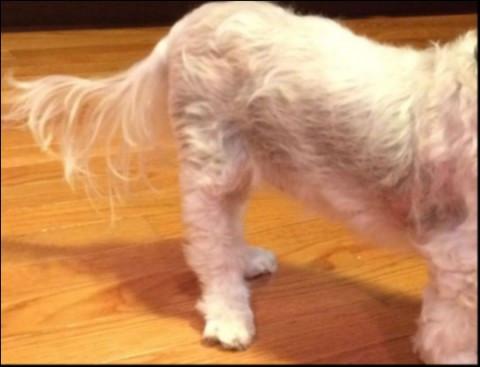Itchy, Biting, Chewing, Scratching - Part 4 - Thyroid!

If you've stuck with us through this series, you have done "everything" you can think of and your dog is still itchy, biting, chewing, and scratching.
The thyroid, a small butterfly like organ in the neck, is responsible for regulating the metabolism of your dog's cellular functions by producing hormones. When the thyroid is unable to produce enough hormones, usually due to an autoimmune disorder, the result can be an itchy, biting, chewing, scratching dog.
Years ago one of our own 4-Leggers was diagnosed with hypothyroidism; but not before it was late stage and over 70% of the thyroid was likely damaged. Since the thyroid can't repair itself, it is important to catch it early.
In hindsight and armed with knowledge of what to look for and what to tell our veterinarian, it might have been caught earlier.
Hypothroidism most commonly develops in middle-aged dogs between the ages of 4 - 10 years. While it generally affects mid-large size breeds of dogs and is rare in toy and miniature breeds, it can occur in any dog. There are also some breeds that are genetically more predisposed to develop the condition. Environmental factors can also play a role and serve as triggers for autoimmune reactions: harmful chemicals, flea and tick products, heartworm drugs, and vaccines.
Our dog didn't fit the typical mold. Her most prevalent symptom was being itchy which was attributed to allergies. She is small and not one of the genetically predisposed breeds. We also didn't link her grumpy disposition to her health and therefore never though to report it! So, what can you look for as an early indicator of hypothyroidism?
Here are some of the classic symptoms:
- Your formerly happy dog is grumpy
- Your dog may snap, growl, or become aggressive
- Your dog starts to display obsessive compulsive behaviors or is suddenly fearful
- Weight gain (when not being overfed)
- Tired/sedentary
- Cold intolerance
- Itchy
If caught early, there are natural therapies that you can try before synthetic thyroid replacement.
Here are two great references for you to learn more about hypothyroidism as well as other issues that may occur with the thyroid.
References:
- DogsNaturallyMagazine
- The Canine Thyroid Epidemic: Answers You Need for Your Dog by Dr. Jean Dodds (DMV) and Diana R. Laverdure





